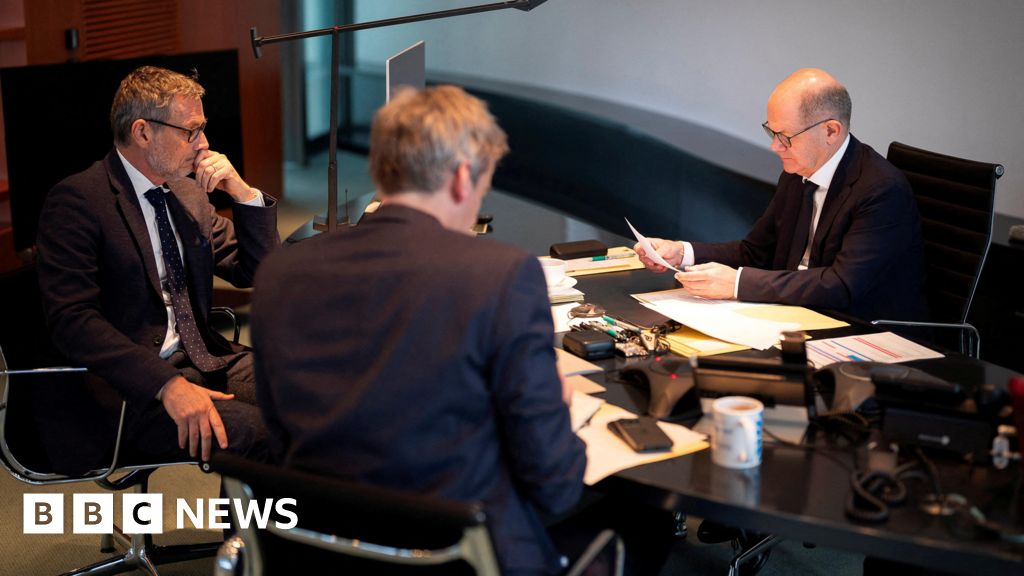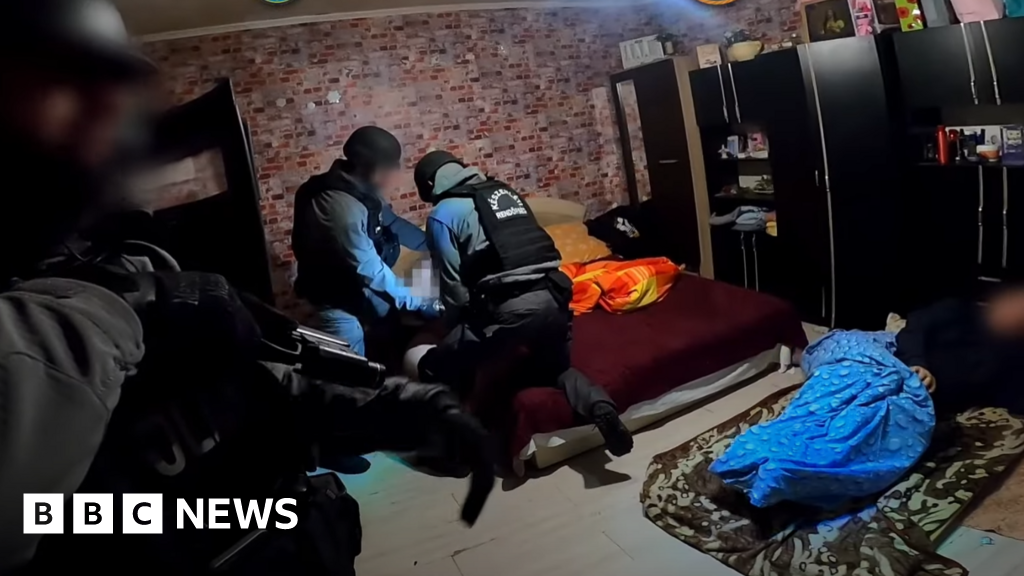ARTICLE AD BOX
By Matt McGrath
Environment correspondent
Image source, Getty Images
World leaders are arriving in Glasgow for the COP26 climate summit, where they will be asked to make ambitious cuts in warming gases to prevent further global temperature rises.
As negotiators prepare for two intense weeks of talking, here are five major challenges that have to be overcome.
1. Trust
Forget talk of temperature rises or dirty coal. The real challenge facing negotiators at this key conference is the issue of trust, or the lack of it.
The key relationships that led to success at the major climate conference in Paris in 2015 have all taken a battering.
The US and China came together then to reach agreement. After four years of Donald Trump and increasing rivalry, the two countries now eye each other with deep suspicion.
COP26 climate summit - The basics
- Climate change is one of the world's most pressing problems. Governments must promise more ambitious cuts in warming gases if we are to prevent greater global temperature rises.
- The summit in Glasgow is where change could happen. You need to watch for the promises made by the world's biggest polluters, like the US and China, and whether poorer countries are getting the support they need.
- All our lives will change. Decisions made here could impact our jobs, how we heat our homes, what we eat and how we travel.
The so-called "high ambition coalition" of island states, developing economies and the EU that really pushed things forward in France in 2015, is now not the force it was.
On top of all that, there's also money problems: The failure of the international community to make good on the delivery of a long-promised $100bn to help poorer countries cope with climate change has gone down badly.
However you dress it up, it has dented trust at a critical time.
Speaking at the G20 meeting in Rome just before flying to Glasgow for the COP, UN Secretary General Antonio Guterres underlined just how important the question of trust was.
"If we want real success, and not just a mirage, we need more ambition and more action," he said. "That will only be possible with a massive mobilization of political will. And that requires trust among the key actors."
"Today, trust is in short supply. There are serious questions of credibility."
Unless this deficit is overcome, Glasgow is likely to fall well short.
2. Credibility
Key to any success in Glasgow has to be the credibility of the host nation.
France is generally seen as setting the bar for what a successful presidency looks like, when it hosted the Paris COP in 2015.
Image source, IISD/ENB - Kiara Worth
Image caption, UK minister Alok Sharma will be in charge of the negotiations for COP26The UK faces some challenges in this area, though it has some credit in the bank too.
"The UK has led from the front for many years," said Kaveh Guilanpour, a long-time climate negotiator and now with the Centre for Climate and Energy Solutions.
The government's strong commitment to the Paris goal of achieving net zero by 2050 - that is, to not add any more carbon emissions to the atmosphere than it can remove - creates credibility, he says.
However, on the other side of the ledger, the UK government has run into trouble over plans for a coal mine in Cumbria, and by announcing cuts to air passenger duty just last week.
Of even more importance perhaps is the cut to Overseas Development Aid (ODA), which saw that UK's annual support reduced from 0.7% of national income to 0.5%.
"Boris Johnson and his Cabinet have undoubtedly made life additionally difficult for themselves," said Richard Black, a senior associate at the Energy and Climate Intelligence Unit.
3. The workload
One of the biggest challenges for this COP is the sheer volume of work.
The postponement of last year's meeting due to Covid is one cause, but it's also because efforts to carry out the negotiations virtually haven't worked. Delegates were happy to talk, but refused to take decisions until they met face to face.
So Glasgow has a huge agenda, particularly on the question of financing how countries deal with climate change.
Image source, Getty Images
Image caption, Negotiators asleep as talks drag through the night in Copenhagen COP15 in 2009There are also complex details about how the Paris agreement should be implemented that still haven't been resolved. Questions on transparency, carbon markets, and having the same timeframes for cutting carbon emissions, have defied the best efforts of negotiators in the six years since Paris.
"There is a real risk that failure on a relatively small issue at the end of the second week could be the headline," said Mr Guilanpour.
"The huge backlog means there are highly controversial items that could cause delays with serious consequences for getting all the work done."
4. The process itself
There is a growing sense among many participants that this UN negotiating process is no longer fit for purpose.
The need for consensus from 197 parties, and the legalistic and technical nature of the talks, means there is, in reality, very little room for actual negotiations.
For this summit, the UK has been determined to bring in real world examples of success to show that fighting climate change can be good for the planet and good for business.
The UK is also eager to conclude a series of side deals on questions like deforestation, on methane, on coal and on protecting nature - it believes that the COP needs to be seen as not just a dull talking shop, but a space to highlight best practice and encourage action.
Some participants believe the climate crisis is now so serious they want to see real reform of the COP to bring in carrots and sticks for countries to meet their pledges.
"There has to be an accountability factor, because otherwise, countries can pledge anything and can promise anything," says Dr Deborah Brosnan, who's advising the Antigua and Barbuda team here.
5. The spin
For months, politicians, negotiators and journalists have been arguing over what success at this conference looks like.
This isn't Paris in 2015 or Copenhagen in 2009, where deal/no deal made it very easy to tell if it was thumbs up or down.
The UK's stated aim to "keep 1.5C alive" - referring to the limit to the annual rise in average temperatures, compared to pre-industrial times. It is a handy sound bite that belies the massive shift in ambition required to achieve it.
Look a little closer and what the UK actually means is that it wants to deliver a "roadmap" (odd choice of word) that will essentially mean that all countries revise their carbon cutting targets in the very short term, not every five years as is currently the case.
Alternatively, and more likely, the COP might finish with a bun-fight where developing countries reject any attempt to get them to come back with improved offers in a year or three.
The UK might be left with a wishy-washy political declaration that aspires to more but doesn't commit anyone to actually do anything.
And all the extra commitments on issues like cutting methane emissions, shipping emissions and so on, might be an unenforceable wish list, dressed up to impress.
Once the final gavel comes down, expect a head-turning flurry of spin from the UK and others to convince the world that Glasgow has really delivered.
"Briefings go directly from the political leader's office to political journalists who rarely have any background in the UN climate process," said Richard Black, who is also a former BBC environment correspondent.
"News coverage often focuses on political theatre rather than the actual issues. Rhetorical leadership gets mistaken for the real thing."
But keep the central question in mind. Is the prospect of keeping the world under 1.5C of warming now more likely?
"If there's a golden rule to cutting through the spin, it's to try and understand the issues, and look at what leaders do, not at what they say," said Mr Black.
Matt McGrath has been covering climate change for the past 15 years, reporting from 10 COPs along the way. You can follow him on Twitter @mattmcgrathbbc.

 3 years ago
110
3 years ago
110








 English (US)
English (US)